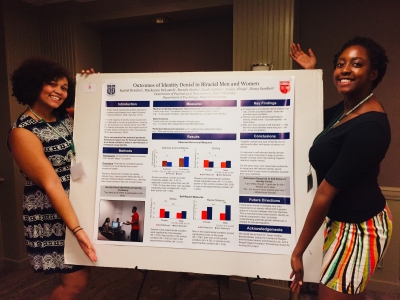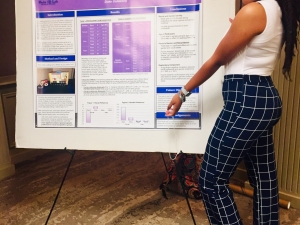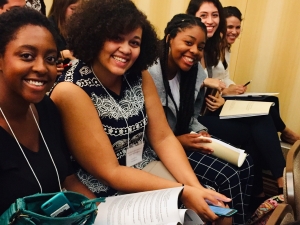
The Duke Identity and Diversity Lab, led by Dr. Sarah Gaither, had an amazing showing with other Duke P&N members at the Society of Southeastern Social Psychologist Conference this year. Their day started off with lab manager Joshua Perlin's first ever data blitz talk on prosocial behaviors for children sharing across racial group lines. Next, graduate students Brenda Straka and Adam Stanaland each presented their first conference talks on their work focusing on social exclusion expectations and gender identity threat responses.
These students were supported by travel awards from the Department of Psychology and Neuroscience made possible through a generous gift from the Charles Lafitte Foundation.
Undergraduates Mackenzie DeLoatch and Kaelah Brauher presented their first peer-reviewed research poster looking at biracial identity denial experiences while Nneka Nwabueze presented her first peer-reviewed poster investigating children's seating preferences based on race and gender. The undergraduates also attended a special graduate student panel to help prepare them for applying to graduate school in addition to a number of other symposia and poster sessions focusing on social relationships, stereotypes and bias, and morality. These students offer some reflections on their experience:
Mackenzie DeLoatch (Junior)
My experience at the conference for the Society of Southeastern Social Psychologists was incredibly fun, informative, and fulfilling. Throughout the course of the day, I got to go to a variety of talks from different people examining different aspects of social psychology. I went to a couple of presentations by Duke undergraduates who discussed gender threat and social exclusion experiences. I’m really interested in studying race, so I was really excited to be able to go to a series of talks about racism and discrimination. One talk in particular that I found interesting was one that discussed the most effective ways that White individuals can address racist comments made by other White people. At the end of the day, I presented my poster on the outcomes of racial identity denial for biracial men and women. In the past, I had mostly discussed my project with people who worked in my lab and were therefore already familiar with it, so it was really great to be able to present my work to other people. It was really encouraging to talk with people who are interested in the same areas of knowledge as I am and to hear their thoughts and opinions about this topic. Overall, the day spent at this conference widened my horizons and made me excited to do more research in the future.
Kaelah Brauher (Junior)
I thoroughly enjoyed my time at the SSSP conference, and I learned a great deal while there. Attending the various sessions was interesting because I was able to learn about so many different research topics. It showed me how wide the field of social psychology reaches. There were sessions ranging from addressing different factors of political orientation to sessions covering relationship issues. In regards to the poster session, I really had a great time. I loved having the opportunity to share my work with others who were truly interested in the topic. Multiple people during the poster session came up to us and said they had heard about a poster covering biracial identities and were excited to learn more. The poster session felt much less like a presentation and more like a conversation. Additionally, many of the viewers brought up very interesting questions and topics for further study.
Nneka Nwabueze (Sophomore)
I presented my first-authored poster entitled, “Young Children’s Gender (but not Race) Preference in a Seating Distance Game” which reflected the work I started during the VIP program this past summer. Our study explored how Black and White 4 and 5-year olds’ age, race, and gender affect their social preferences. We found that Black girls are showing a preference for their racial in-groups and their gender outgroup. But for White girls, and Black & White boys, we’re not seeing much of racial or gender preference. During the poster presentation, I was posed many thoughtful questions including: Why are black girls are showing such preferences? Does their schooling environment affect their preferences? I also spent time at the Graduate student panel, learning steps that I can take to prepare for Graduate level schooling and applications. Furthermore, I sat in on a few talks about sexuality, gender, and exclusions to help expose me to other research areas.


